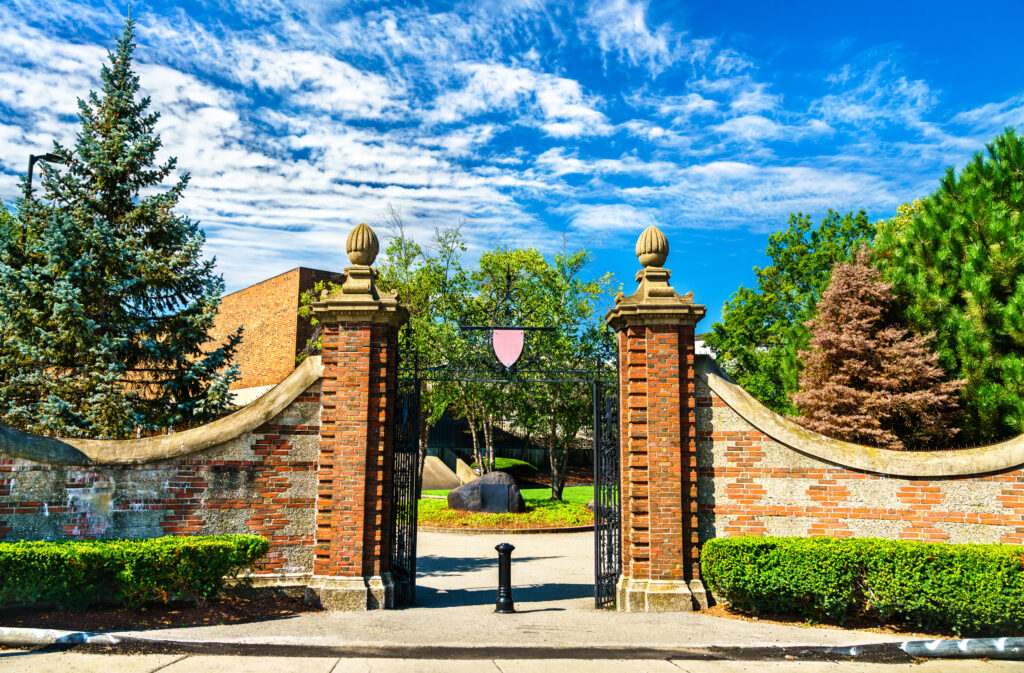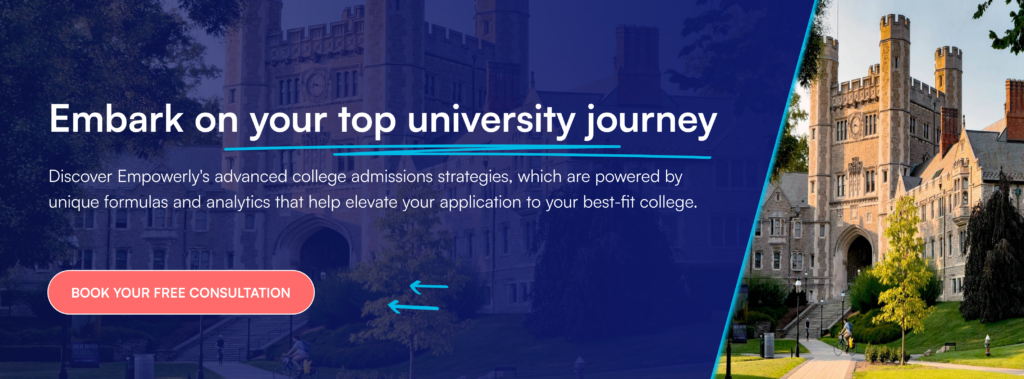So, you want to get into Harvard?
It’s no small feat. Founded in 1636, Harvard is the oldest existing university in the United States. From former presidents to pop culture lore, the name Harvard instantly brings to mind images of ivy-lined brick and verdant lawns. The school’s legacy of academic excellence is perhaps only rivaled by the legacy of its fiercely competitive admissions process. More than two hundred years after its charter, as the subject of a series of powerful political lawsuits, the elite school has never been more rigorous. In recent years, its acceptance rate has dipped as low as 3% for the Class of 2028, with just 1,937 students admitted out of over 56,000 applicants.
Translation? Even a perfect GPA and stellar test scores won’t guarantee admission. So what can get you in?
While it’s not impossible, the bar is sky high. With a record-breaking number of applicants each year, students aiming for Harvard — or any Ivy League-caliber institution, for that matter — need a smart, strategic approach. That’s where admissions experts come in; at Empowerly, our team helps students identify their unique strengths, align their goals, and tell powerful stories in their applications. Today, we’ll dive into how to get into Harvard — and how to earn a degree that unlocks future success.
First, let’s start with introductions. Here are some Harvard admissions quick facts about the Class of 2028:
- Acceptance rate: ~3%
- Applications: ~56,000
- Admits: ~1,937
- Middle 50% SAT: 1480–1580
- Middle 50% ACT: 33–36
What makes Harvard University unique?
Apart from being the oldest college in the nation, what makes Harvard different? Other than a very unusual mascot (“John the Pilgrim” cheers on the Harvard Crimson at sporting events), there’s plenty that sets this school apart from the pack.
A global academic powerhouse
Let’s start with the obvious: Harvard’s academic resources are unparalleled. The university offers more than 50 concentrations (Harvard’s term for majors), over 3,700 undergraduate courses, and access to world-renowned research facilities. Its faculty includes leaders in every field—from medicine and computer science to the humanities.
The school also boasts the world’s largest academic library system, with over 20 million volumes, not to mention the largest financial endowment of any university (in the neighborhood of 50 billion). What does that mean for students? Exceptional opportunities, world-class instruction, and unrivaled access to academic support.
A campus that shapes character
Harvard’s historic campus, sometimes referred to as “the Yard,” is situated in Cambridge, Massachusetts, and combines innovation and tradition. Students are guaranteed to form close-knit communities with their own support system and culture thanks to the residential college system. Students participate in thousands of extracurricular activities, such as intramural sports and the Harvard Crimson newspaper, to keep occupied, meet new people, and apply what they have learned.
Alumni outcomes that speak for themselves
Graduating from Harvard opens doors. And wallets! But beyond the potential bonuses to your paycheck, alumni benefit from an influential global network that spans industries, continents, and generations. The school’s alumni include Nobel laureates, U.S. presidents, tech entrepreneurs, and Pulitzer Prize winners, among others.

How does Harvard make admissions decisions?
Getting into Harvard means standing out — not just academically, but personally.
The admissions team conducts a holistic review, meaning they evaluate each applicant in full context. That includes your academic record, test scores (if submitted), extracurriculars, recommendations, essays, and personal background.
Naturally, this is a nuanced process. For broad strokes, here’s what college admissions officers at top schools like Harvard are looking for:
- Academic excellence: Challenging course loads (AP, IB, honors) with top marks
- Intellectual curiosity: A demonstrated love of learning that goes beyond the classroom
- Leadership & impact: Meaningful contributions to school, community, or causes
- Unique talents: Artistic, athletic, or other personal strengths
- Potential to contribute: Evidence that you’ll enhance the greater campus community
Empowerly Tip: Don’t try to be everything to everyone (that’s exhausting, anyway). Instead, focus on what makes you exceptional — and how your goals align with Harvard’s values. This authenticity will ring true on your application.
What can you study at Harvard?
Harvard offers a robust liberal arts education, allowing students to explore broadly before specializing. Some of the most popular undergraduate concentrations include:
- Economics
- Computer Science
- Government
- Psychology
- Biological Sciences
Beyond the standard offerings, students can even earn dual degrees through Harvard’s joint programs or pursue interdisciplinary tracks that bridge multiple subjects. You can search and filter your options on the Harvard website here.
Harvard’s adaptable academic model supports a wide range of goals, including entrepreneurship, policy research, and medical school.
What does it take to get into Harvard?
Next, we’ll talk about what it takes to earn a place on Harvard’s famous campus.
High academic performance over time
Most admitted students rank in the top 10% of their high school class, and often report a weighted GPA above 4.0. But context matters. Admissions officers evaluate your grades in light of your school’s rigor and grading system.
Challenging coursework
Top applicants challenge themselves with AP, IB, or dual-enrollment classes, especially in core academic areas like math, science, and literature.
Standout, lyrical essays
Harvard’s supplemental essays give you an opportunity to highlight your background, values, and unique voice as a student. While you obviously want to emphasize your accomplishments, don’t just repeat your resume; this is your chance to be intimate, truthful, and memorable. Try to find essay topics that highlight your character and how your brain works, rather than just restating achievements. Use a specific, memorable story to show not only what you learned, but why it matters.
Glowing letters of recommendation
Choose teachers who know you well and can speak to both your academic ability and your personal growth. A letter that captures your curiosity or kindness can make a big impact to convey your personal depth and self-awareness.
Competitive standardized test scores (optional)
Though Harvard remains test-optional through at least 2026, most admitted students still submit high scores. The middle 50% SAT range is 1480–1580; the ACT range is 33–36.

Strategies that boost your chances
Harvard’s admissions process is holistic, considering both academic achievements and personal qualities. To enhance your application, consider the following strategies:
1. Pursue challenging classes
Push yourself in school. Engage in the most challenging courses available at your high school, especially in core subjects:
- English: Four years, emphasizing extensive reading and analytical writing.
- Mathematics: Four years, focusing on conceptual understanding. Courses like statistics, calculus, or computer science are beneficial, but calculus is not mandatory.
- Science: Four years, including biology, chemistry, and physics, with at least one at an advanced level.
- History/Social Studies: At least two years, preferably three, covering U.S. and world history.
- Foreign Language: Four years of the same language to demonstrate depth of study.
2. Develop strong writing skills
Unfortunately, you’re not done with writing essays when you graduate from high school! You’ll need those skills in college, too. So, let’s stop avoiding it and face it head-on. Take part in writing workshops or join a school newspaper as ways to improve your writing. You can even maintain a blog with frequent updates to practice writing in a way that interests you.
3. Engage deeply and get involved in your community
Rather than spreading yourself thin, focus on a few activities that actually really interest you. When it comes to extracurricular activities, quality is definitely better than quantity. Demonstrating leadership and sustained commitment in these areas can showcase your initiative and passion.
4. Seek out and create enrichment opportunities
Take advantage of every opportunity you can! When you have time off of school, try to participate in summer programs, internships, or research projects that align with your academic interests. These experiences can provide deeper insight into your chosen field and strengthen your overall story.
5. Demonstrate intellectual curiosity
Harvard looks for students who exhibit a love of learning. So, what does that look like? In your free time, what do you do? Pursue independent projects, sign up for online classes, attend movies or live performances, and engage in discussions that expand your understanding beyond the classroom.
6. Reflect on your personal growth
Now is the time to show what you’ve learned in action. In your application essays, share experiences that have shaped your character and perspective. Authenticity and self-awareness can leave a lasting impression on admissions officers, and emotional maturity is a very desirable trait.
7. Maximize your application strategy
Our counselors help students craft authentic application narratives that reflect both achievement and potential. For example:
Apply early
If you have the option, Harvard’s Single-Choice Early Action (SCEA) plan is non-binding but restrictive. Applying early can signal commitment — and slightly boost your odds. If you choose to apply early, your application is due on November 1 — months before the regular decision deadline of January 1 — but you can also receive the news faster, in late December as opposed to March or later.
Build a cohesive personal story in your application
Admissions officers are reading thousands of files. Help them remember yours by weaving a consistent narrative across your activities, essays, and recs.
Show demonstrated interest in Harvard
Attend info sessions, engage with admissions reps, or take a campus tour. Even optional interviews matter. Demonstrated interest is a big deal.
Develop your niche (or “spike”)
Instead of being well-rounded, consider being well-angled. One area of standout performance can be more compelling than scattered excellence.

Want more tips? For additional reading, check out this guide to the Harvard application.
By thoughtfully aligning your high school experiences with these strategies, you can present a compelling application that resonates with Harvard’s admissions criteria.
Ready to aim for the stars (and Harvard)?
Here’s a quick recap of the key steps you can take to improve your chances at landing that coveted Harvard acceptance letter:
- Take the hardest courses available and do what it takes to excel.
- Develop a clear and authentic personal narrative.
- Engage deeply in 1-2 extracurriculars with leadership impact.
- Craft standout essays showing intellectual depth and self-reflection.
- Consider applying early to underscore your interest.
That said, getting into Harvard isn’t about checking boxes. It’s about showing who you are, what drives you, and how you’ll make an impact.
At Empowerly, we combine data-backed strategy with personalized guidance. Want to know how close you are to Harvard’s standards? Book a free consultation today and gain expert insight into your academic journey. Our counselors have been in your shoes and know what it takes to make your dreams a reality.
Don’t wait — start shaping your story today.
